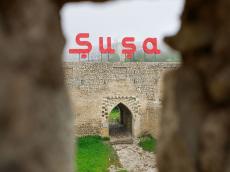|
|
TODAY.AZ / Analytics
Liberation of Shusha: Intersection of History and Strategy
08 November 2024 [18:57] - TODAY.AZ

By Fatima Latifova
Shusha is one of the most culturally and historically rich cities in Azerbaijan. Known as the pearl of Garabagh, this city stands out for its unique nature, historical landmarks, and rich culture. Shusha has also made invaluable contributions to Azerbaijan’s music and literature.
The natural beauty of Shusha further enhances its charm. The city is located at the foot of the Garabagh mountains, at a high altitude, offering a wide panoramic view of the surrounding area.
Shusha's historical monuments showcase the ancient cultural heritage of the Azerbaijani people. The Shusha Fortress, which has symbolized the city and has been preserved for centuries, is a testament to its historical significance. Additionally, the mosques, caravanserais, and fountains in the city reflect Shusha's cultural richness.
However, what makes Shusha important is not just its beauty. The city was one of the most strategic and symbolic places in the Garabagh conflict. The moment Shusha was captured, it marked a turning point, both militarily and politically, alongside the signing of the ceasefire agreement on November 9-10, 2020. The acquisition of Shusha strengthened Azerbaijan's military advantage in the region and also enhanced its position as a state defending its rights on the international stage. Let’s delve deeper into the strategic importance of Shusha and the characteristics of the operations there.
Strategic Importance of Shusha
The liberation of Shusha ensured proximity to Khankendi (the central city of Garabagh). The side that controls Khankendi effectively holds the key to governing the Garabagh region. Additionally, Shusha is situated at an altitude of 1,300 meters, making it a highly advantageous military position. A city situated at such a height allows its forces to control the surrounding areas during military operations. Shusha is also located on the Lachin corridor and other strategic routes. When Shusha was captured, Armenia's supply and communication lines to Garabagh were cut off.
Capturing Shusha with Precision Tactics: No Shells, No Artillery
Two crucial factors stand out in the liberation of Shusha:
By the end of 2020, the Azerbaijani Armed Forces were equipped with advanced technologies, including unmanned aerial vehicles (UAVs) and precision-guided munitions. These technologies weakened Armenia’s air defense capabilities and allowed Azerbaijani forces to advance with fewer casualties around the city. The sacrifices made in this glorious victory were not in vain, and the city was freed from Armenian occupation.
Shusha’s lack of a civilian population, with most of the inhabitants having already left, also facilitated military operations. Unlike the Armenian army, which had often targeted civilians, the Azerbaijani forces did not harm non-combatants, which could have complicated the operation. Although Shusha had numerous defensive lines and trenches, the city's population had been evacuated by Armenia before the war began. This suggests that even the later-settled Armenians knew that one day the true owners of these lands would return, and they had prepared for it in advance.
Shusha’s Liberation: A Symbol of Victory
The capture of Shusha was not just a military success; it was also a symbol of victory. For the Azerbaijani people, it held profound spiritual significance, as Shusha represented the lost culture and historically destroyed heritage of the Garabagh conflict. Its liberation marked a major step in the journey to free Azerbaijan's occupied territories.
The Azerbaijani soldiers’ liberation of Shusha created immense pressure on the Armenian side, paving the way for peace negotiations. After Shusha was liberated, Armenia was left without the means to continue fighting. This left them with no choice but to sign a peace agreement.
The liberation of Shusha was also seen as a reaffirmation of Azerbaijan’s culture, history, and rights in Garabagh.
A Turning Point in the Conflict
The capture of Shusha was not only a military achievement but also a political and cultural turning point in the conflict. This operation demonstrated Azerbaijan's military capability and strategic thinking. The fall of Shusha paved the way for the end of the prolonged Armenian terrorism in Garabagh. It was the result of Azerbaijan’s struggle for justice and rightful sovereignty on the international stage.
URL: http://www.today.az/news/analytics/254722.html
 Print version
Print version
Connect with us. Get latest news and updates.
See Also
- 06 March 2025 [08:30]
I?d?r-Nakhchivan gas pipeline reinforces Azerbaijan-Türkiye ties - 04 March 2025 [15:47]
UN Commissioner’s bias: Truth behind Armenian war crimes & lobbying influence - 02 March 2025 [21:01]
Could Germany's new leading man save Europe and who is he? - 01 March 2025 [19:54]
From Savior to Scapegoat: Ukraine caught in crossfire - 01 March 2025 [08:30]
Ukraine’s Future: Trump’s Security Guarantee or Another Risky Gamble? - 28 February 2025 [14:00]
Azerbaijan, Guinea-Bissau steps into new era of strategic partnership - 27 February 2025 [08:30]
Azerbaijan’s $2B investment in Pakistan – What’s the bigger picture? - 26 February 2025 [19:58]
Azerbaijan strengthens air force with Pakistani JF-17 and joint production plans - 25 February 2025 [10:00]
Azerbaijani oil prices declines - 25 February 2025 [08:30]
Baku, Islamabad forge stronger economic partnership with new investment plans
Most Popular
 Armenia's European integration reaches impasse. As expected
Armenia's European integration reaches impasse. As expected
 UN Commissioner’s bias: Truth behind Armenian war crimes & lobbying influence
UN Commissioner’s bias: Truth behind Armenian war crimes & lobbying influence
 Vovaevich offers Azerbaijan his decrepit corridor again
Vovaevich offers Azerbaijan his decrepit corridor again
 President Ilham Aliyev reprimands State Tourism Agency's Fuad Naghiyev - decree
President Ilham Aliyev reprimands State Tourism Agency's Fuad Naghiyev - decree
 Pashinyan's dreams: the train has left, but he is still waiting
Pashinyan's dreams: the train has left, but he is still waiting
 Baku Media Center's president attends film presentation at Nizami Cinema Centre
Baku Media Center's president attends film presentation at Nizami Cinema Centre
 Russia's insurance company compensates AZAL for Embraer 190 crash in Kazakhstan
Russia's insurance company compensates AZAL for Embraer 190 crash in Kazakhstan
